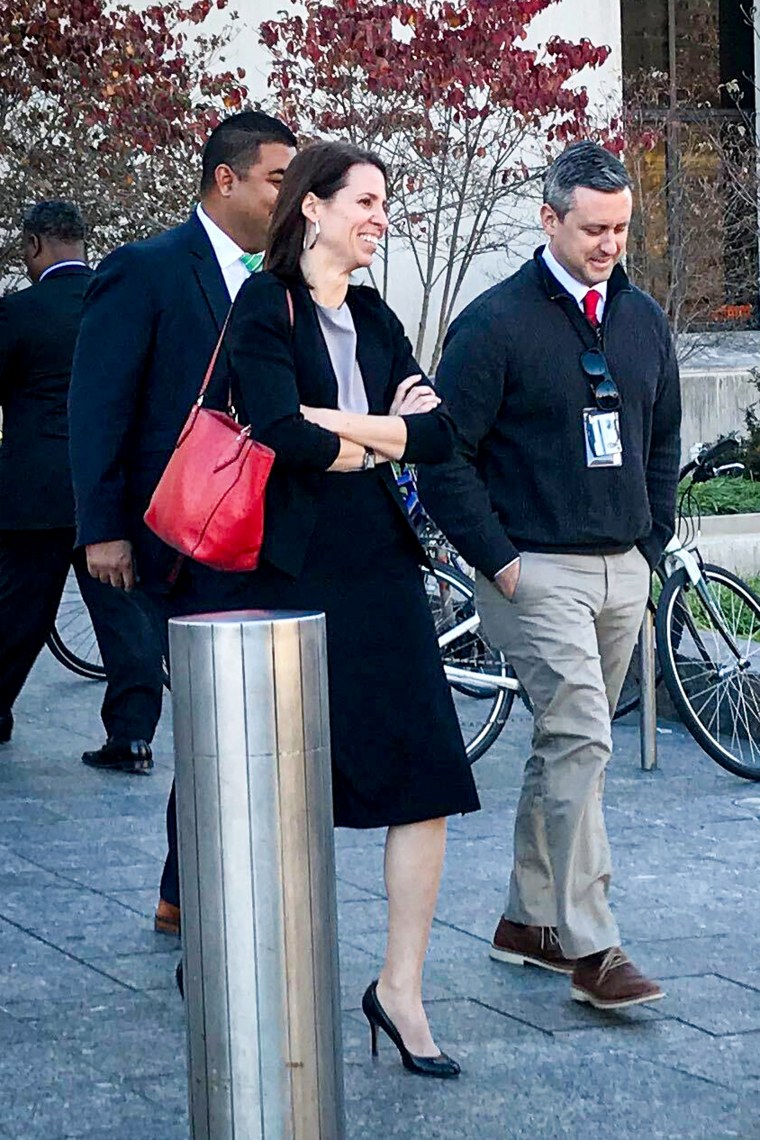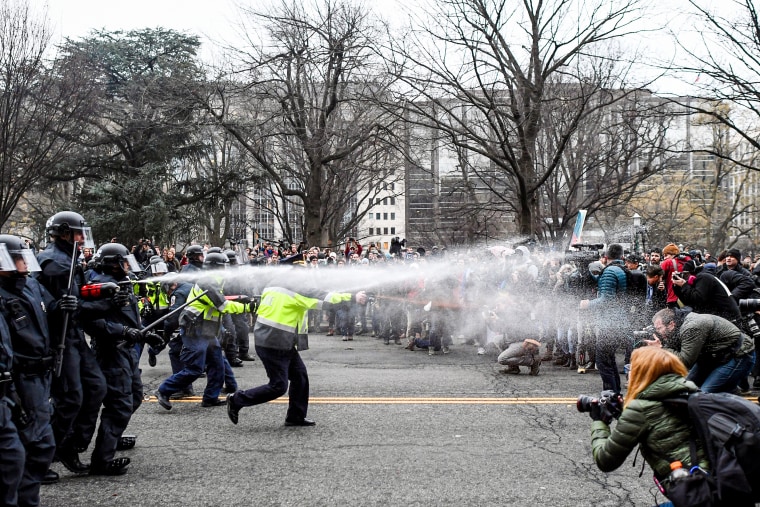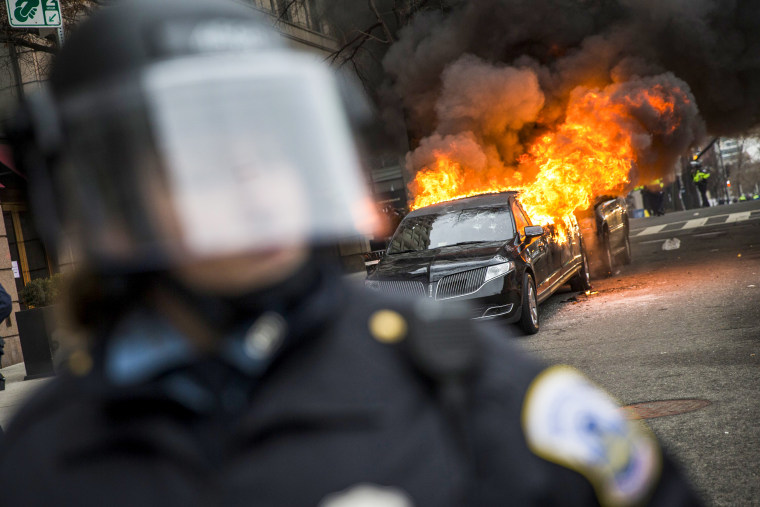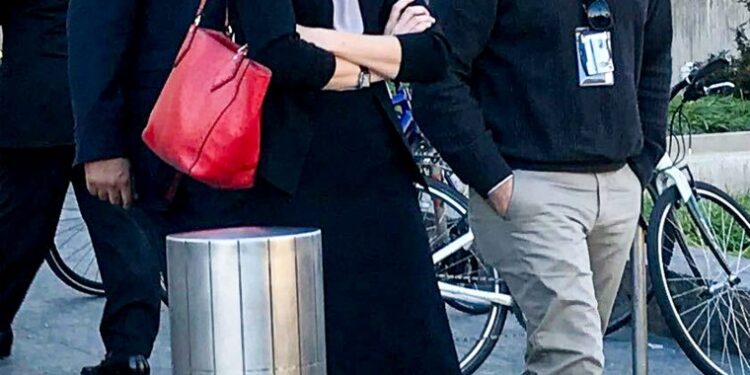WASHINGTON — A Justice Department attorney who led the attempted prosecution of hundreds of anti-Trump and anti-fascist protesters swept up in a mass arrest on the day of former President Donald Trump’s 2017 inauguration is facing rare ethics charges, with the D.C. Office of Disciplinary Counsel alleging she hid exculpatory evidence from the defendants, edited videos to omit crucial context and then lied in court about her actions.

Assistant U.S. Attorney Jennifer Kerkhoff Muyskens, who went by Jennifer Kerkhoff at the time of the alleged misconduct, was the lead prosecutor on the more than 230 cases that arose out of the mass arrests of protesters near Trump’s inauguration on Jan. 20, 2017. Protesters were arrested after police trapped them in a “kettle” after some individuals smashed windows, destroyed a limousine and threw objects at officers during a demonstration against the then-incoming president.
The government adopted the extraordinary tactic of charging hundreds of people arrested on a public street with felony crimes based on the theory that their choice of black clothing meant they were part of a felony rioting conspiracy. But the #J20 prosecutions, as activists dubbed them, were largely a bust for the government. Jurors acquitted the first six defendants to go to trial in late 2017; a judge ordered charges against 10 other defendants dropped because prosecutors withheld evidence; and charges were dropped against all remaining defendants in mid-2018.
Kerkhoff Muyskens and Metropolitan Police Department (MPD) Detective Greggory Pemberton were “primarily responsible for the government’s investigation” into the events of Jan. 20, 2017, according to the ethics complaint against Kerkhoff Muyskens that alleges she violated six of the D.C. Bar’s rules of professional conduct. The Office of the Disciplinary Counsel in Washington, which serves as the chief prosecutor for attorney disciplinary matters, wants the D.C. Board of Professional Responsibility, which is the disciplinary arm of the D.C. Court of Appeals, to consider imposing sanctions on Kerkhoff Muyskens.

Pemberton, who now heads the MPD police union, faced questioning during trials from defense attorneys about his “anti-liberal biases,” the complaint noted. When defense counsel raised “troubling” edits to video evidence that they believed were made by Pemberton, Kerkhoff Muyskens “falsely told the court that only she — not Pemberton — was responsible for the edits,” according to the complaint.
At issue is footage from Project Veritas, a conservative group that filmed undercover videos, which was essential to the case brought by prosecutors.
Both Kerkhoff Muyskens and Pemberton understood that Project Veritas “had a reputation for editing videos in a misleading way,” the complaint states. Kerkhoff Muyskens and Pemberton also “omitted and cut footage from the original videos, in part, to remove footage of the operative that could reveal his identity or reveal the identity of Project Veritas as the source of the video,” the complaint states.
Even though Project Veritas provided videos of another training session that occurred at American University on Jan. 14-15, Kerkhoff Muyskens didn’t turn those videos over to defense lawyers, the complaint alleges. The complaint said the undisclosed videos “consistently showed that protesters were trained and instructed to expect a non-violent protest; to remain non-violent; to use non-violence and de-escalation techniques with police and counter-protesters; to be wary of counter-protester infiltrators, including Project Veritas; to rely on MPD to handle any violence from either protesters or counter-protesters; to stay close with their protest group for safety and security; and to comply with police instructions and ‘police lines.'”

Neither Kerkhoff Muyskens nor Pemberton responded to a request for comment from NBC News. Federal court records show that Kerkhoff Muyskens, now just going by Jennifer Muyskens, has been working as an assistant U.S. attorney in Utah, bringing new cases as recently as last month. James O’Keefe, who founded Project Veritas and headed the organization at the time of Trump’s inauguration but was removed last year, did not respond to a request for comment, nor did the U.S. Attorney’s Office for the District of Columbia.
The U.S. Attorney’s Office for the District of Columbia — which is running the prosecution of more than 1,400 defendants in connection with the Jan. 6 attack on the U.S. Capitol — is unique in that it prosecutes both “local” crimes in D.C. Superior Court, as well as federal crimes in U.S. District Court. The #J20 prosecutions were brought in Superior Court, while the Jan. 6 cases have almost entirely been brought in federal court. Prosecutors have already secured more than 1,000 convictions in connection with Jan. 6, with sentences ranging from probation to 22 years in federal prison, for a former Proud Boys chairman convicted of seditious conspiracy.
The government’s botched prosecutions of anti-Trump inauguration protesters have informed the handling of the Jan. 6 prosecutions, and in some ways, Capitol attack defendants have benefitted from the lessons learned.
In contrast to the prosecution of Jan. 6 defendants, the extraordinary #J20 prosecutions received very little attention from the national media at the time, which was largely focused on the chaos of Trump’s first year in office and with Robert Mueller’s special counsel probe, which began in May 2017.
During her theatrical presentations to the first J20 jury, Kerkhoff Muyskens referred to a “sea of black masks” and walked jurors through the often relatively benign contents of defendants’ backpacks, even though she conceded there was zero evidence that the six protesters, who were ultimately acquitted of felony charges, had engaged in any property damage or violence and were arrested en mass on a public street.
“Each of them made a choice, and each of them played a role,” Kerkhoff told jurors during her opening statement. “You don’t personally have to be the one who breaks the window to be guilty of rioting.”







